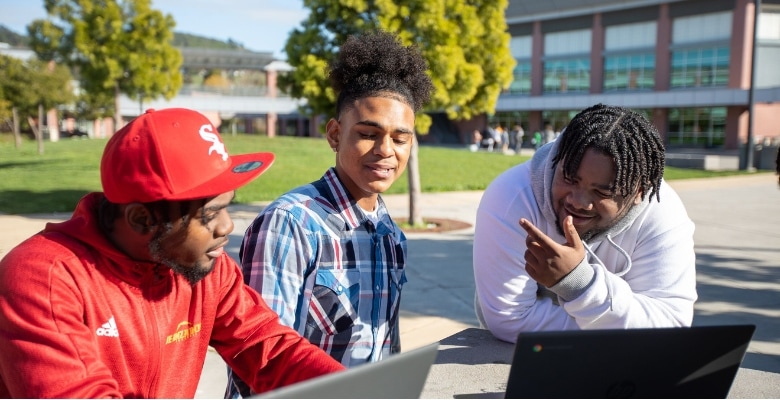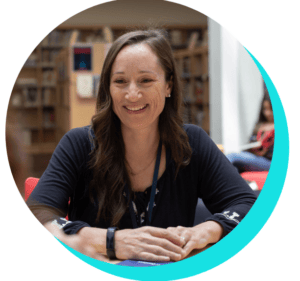College and career readiness is a frequently used metric in schools and in the postsecondary access field. But how is readiness defined? And what steps can schools take to help pave the way?
First-generation college students are in a unique situation as they navigate the college process, enroll in a postsecondary program, and fulfill the requirements to earn a bachelor’s degree. There are many factors that may contribute to the lack of degree completion that many of these students experience. Poor college readiness, inconsistent resources, lack of staffing, and the complexity of college systems create a degree divide and challenges that are unique to low-income and first-generation students. When asked about what OneGoal has meant for him, Jason S., a class of 2023 OneGoal Fellow, answered “Hope.” For many students, like Jason, hope is the first step. Jason has taken this hope, leaned on the support offered, and now attends Johnson and Wales University. OneGoal aims to arm students with more than just hope. With systems of support, students are more likely to realize their postsecondary goals and graduate college.

What is the Degree Divide?
Students of color, first-generation students, and those from low-income communities are less likely to earn a bachelor’s degree than their counterparts. Regardless of academic merit, the rigor of classes, and extracurricular activities, the gap between students with financial and supportive means continues to expand while their counterparts land on the other side of a widening disparity. According to the Pell Institute and PennAHEAD, only 15% of low-income students will earn a bachelor’s degree, whereas 59% of students in the highest income bracket will complete college. The financial barrier is only one reason for this widening opportunity gap. Other barriers to success include a lack of college readiness, familial knowledge of the college process, low academic self-esteem, and difficulty adjusting to college life. However, there are solutions to these issues, and students, if offered consistent support, can overcome the opportunity gap.
What is a college degree really worth?
It may seem obvious that a college degree creates job opportunities and financial stability. Economist Philip Trostel, author of It’s Not Just The Money: The Benefits of College Education to Individuals and to Society suggests that the earnings benefits are only “the tip of the iceberg” and that there are many other benefits to both the student and society as a whole. College graduates have the opportunity to earn more than $32,000 per year and an increase in lifetime earnings. They have access to healthcare benefits, retirement plans, and retirement planning with a greater degree of job security and employment options. Programs like OneGoal strive to ensure that students have consistent support and guidance when it comes to choosing a career that will serve them in the current job market; choosing a college that fits their financial, academic, and emotional needs; and selecting a school that represents their identity. These very calculated supports are designed and implemented to ensure that students are not only getting into the right school for them, but also are in a place that will give them the best opportunity to succeed in college, graduate, and be competitive in the job market.
What does a Supportive Network include?
An all-encompassing, proactive, targeted approach with support is necessary for aiding students in their quest for a college degree and success in today’s job market. Ensuring that students have access to mentors, information, and classes that aim at college and career readiness in high school and in college offers them the best chance at earning a degree. Each year, the support that students need will change.
In junior year, parents, administrators, guidance counselors, teachers, and mentors should start by asking students about their interests, goals, and plans for the future. Schools can further support students by offering classes that align with their postsecondary interests. They can also provide students with coursework that will enhance their college readiness by allowing them to acquire the essential skills necessary for succeeding in college and career, like being able to write an academic essay and having the necessary math skills to be able to take a college-level course. College readiness relies not only on academic rigor, but also having a financial literacy of the college process, like navigating FAFSA, having the emotional maturity to handle college life, and having the ability to properly manage time.

In their senior year of high school, students will need help with filling out the FAFSA, completing their essays and applications, applying for scholarships, making a final decision, and the enrollment process. Parents, guidance counselors, and mentors can play a major role this year, not only with the logistics of completing the tasks, but also with the emotional support that students need during this time. Weekly check-ins with students, timelines for task completion, and ready answers to student and family questions are additional ways to help students be more likely to succeed.
OneGoal provides the necessary supports so that students who have the hope and the drive to graduate college actually find that success. Not only does OneGoal’s classroom-based model offer support for students in their junior and senior years in high school, but it also goes a giant step further in providing mentorship and assistance through the first year of college. Ideally, students have access to the same Program Director, or mentor, for three consecutive years, thus combating some of the traps of the opportunity gap and allowing for consistent care and guidance. Sometimes, these vulnerable students get into a best-fit college and are in a great financial position for affording school but still fall short of graduation due to challenges they face in the first year of college
According to Sharon Greenthal at verywellfamily.com, there are several challenges that first-generation college students face. In fact, it seems that many of the factors have little to do with aptitude, readiness, or academic-specific skills but more to do with emotional and psychological factors such as guilt, social differences, and support from home. These college freshmen often have a hard time adjusting to leaving home and facing feelings of guilt for chasing their goals and leaving their families behind. They also may encounter social situations that cause them to feel like they are on the outside looking in because they haven’t had similar experiences in the past or may be unable to afford to participate in some social activities that college life offers. Further, a lack of family understanding about the unique challenges and emotional support necessary for navigating a new environment may lead students to decide to leave college before earning a degree.
Both colleges and programs like OneGoal are well aware of these pitfalls, which is why the supports continue through the college years. Students are encouraged to enroll in systems of support for first-generation college students and low-income students. In fact, public institution University of Massachusetts Amherst has a program called FLIP specifically designed to aid students with their academic, social, financial, and emotional needs. They offer a plethora of social programs including tutoring and mentorship. Similarly, the University of Massachusetts Dartmouth has the TRiO/SSS program aimed at increasing student retention and graduation rates. This program provides tutoring, workshops, and grants. Most colleges offer similar programs with the main goal of helping students get to the finish line of graduation.

Bridging the Opportunity Gap
While the dream of college often starts with hope, it is up to teachers, mentors, school administrators, guidance counselors, and parents to bridge the opportunity gap, decrease the degree divide, and provide the necessary tools that particularly target the obstacles that first-generation students uniquely face. The supports cannot be “one-offs,” but instead need to span years of the student’s life. This guidance provides students with the best chance for obtaining a college degree and better preparation for the current and future job market.
Leah Zell is an educator with 23 years of experience in schools as an athletic trainer, teacher and dean of students, both in the private school and public school settings. Her education consists of a BS in Athletic Training from Springfield College and a M.Ed in School Leadership from The George Washington University. Most recently Leah has worked as a classroom teacher at New Bedford High School teaching various electives and had been a Program Director with OneGoal for 2 years. She is currently supporting fellows in Year 3 as they embark on their journey through their freshman year of college.

Related Stories
Explore the unique challenges faced by first-generation college students and the importance of dismantling barriers to provide equal opportunities for academic success and career achievement.
Promoting Equity in Education: District administrators and stakeholders can provide equitable opportunities through culturally relevant teaching, leadership training, and targeted support for the most vulnerable students.





